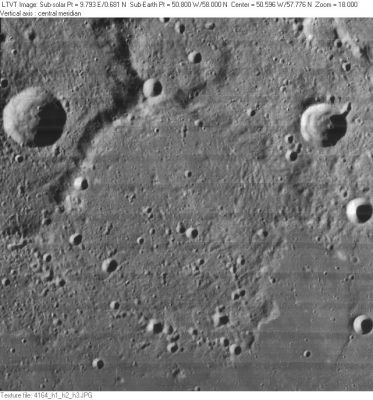South
Contents
South
|
Lat: 58.0°N, Long: 50.8°W, Diam: 104 km, Depth: 0.97 km, Rükl: 2, pre-Nectarian |
LO-IV-164H South is the vaguely bounded region of rough terrain in the center of the frame. To its upper right is 24-km Robinson, and to the upper left a small part of 143-km Babbage with 14 km Babbage C on its floor.
Images
LPOD Photo Gallery Lunar Orbiter Images
Maps
(LAC zone 10B3) USGS Digital Atlas PDF
Description
Description: Elger
(IAU Directions) SOUTH.--On the E. and S., the boundaries of this extensive enclosure are merely indicated by ridges, which nowhere attain the dignity of a wall. On the N., the edge of a tableland intersected by a number of valleys define its limits, and on the W. a border forming also the E. side of Babbage. The interior is traversed by a number of longitudinal hills, and includes two bright little heights, drawn by Schmidt as craters.
Description: Wikipedia
Additional Information
Depth data from Kurt Fisher database
- Westfall, 2000: 0.97 km
- Cherrington, 1969: 1.58 km
The red spot in South
- Small reddish spot in South, observed by Maw on 15th June 1913. Source: V.A.Firsoff's The Old Moon and the New (1969), page 185.- DannyCaes May 19, 2012
- At the northwest end of South is a rugged plateau, on this Dr. W.H.Maw saw on 1913, June 15, when the plateau was on the terminator, a distinct small reddish spot, which became diffused into a patch as the terminator advanced. Source: Walter Goodacre's APPENDIX in T.W.Webb's Celestial Objects for Common Telescopes (Volume 1: The Solar System), page 163.- DannyCaes May 20, 2012
Nomenclature
- Named for James South(1785-1867), a British astronomer .
- The name was introduced by W. R. Birt in 1862-3.
- This feature is Catalog number 1706 in Mary Blagg's Collated List, where it is noted as being named only in Neison, 1876.
- The name (attributed to Birt) was added to the IAU nomenclature in Named Lunar Formations.
LPOD Articles
Bibliography
- Birt, W. R. 1863. "On a Group of Lunar Craters imperfectly represented in Lunar Maps." Report of the British Association for the Advancement of Science 1862 Meeting. Notices Section (at end), pp. 9-12.
